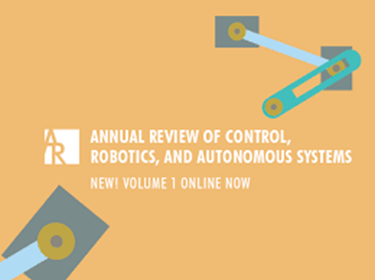Noise in Biomolecular Systems: Modeling, Analysis, and Control Implications
IF 14
1区 计算机科学
Q1 AUTOMATION & CONTROL SYSTEMS
Annual Review of Control Robotics and Autonomous Systems
Pub Date : 2023-05-03
DOI:10.1146/annurev-control-042920-101825
引用次数: 2
Abstract
While noise is generally associated with uncertainties and often has a negative connotation in engineering, living organisms have evolved to adapt to (and even exploit) such uncertainty to ensure the survival of a species or implement certain functions that would have been difficult or even impossible otherwise. In this article, we review the role and impact of noise in systems and synthetic biology, with a particular emphasis on its role in the genetic control of biological systems, an area we refer to as cybergenetics. The main modeling paradigm is that of stochastic reaction networks, whose applicability goes beyond biology, as these networks can represent any population dynamics system, including ecological, epidemiological, and opinion dynamics networks. We review different ways to mathematically represent these systems, and we notably argue that the concept of ergodicity presents a particularly suitable way to characterize their stability. We then discuss noise-induced properties and show that noise can be both an asset and a nuisance in this setting. Finally, we discuss recent results on (stochastic) cybergenetics and explore their relationships to noise. Along the way, we detail the different technical and biological constraints that need to be respected when designing synthetic biological circuits. Finally, we discuss the concepts, problems, and solutions exposed in the article; raise criticisms and concerns about current ideas and approaches; suggest current (open) problems with potential solutions; and provide some ideas for future research directions.生物分子系统中的噪声:建模、分析和控制意义
虽然噪音通常与不确定性联系在一起,并且在工程中通常具有负面含义,但生物体已经进化到适应(甚至利用)这种不确定性,以确保物种的生存或实现某些本来很难甚至不可能实现的功能。在这篇文章中,我们回顾了噪声在系统和合成生物学中的作用和影响,特别强调了它在生物系统遗传控制中的作用,我们称之为控制论遗传学。主要的建模范式是随机反应网络,其适用性超越了生物学,因为这些网络可以代表任何种群动态系统,包括生态、流行病学和舆论动态网络。我们回顾了不同的数学方法来表示这些系统,我们特别认为遍历性的概念提出了一个特别合适的方法来表征它们的稳定性。然后,我们讨论了噪声诱发的特性,并表明噪声在这种情况下既是一种资产,也是一种麻烦。最后,我们讨论了(随机)控制遗传学的最新成果,并探讨了它们与噪声的关系。在此过程中,我们详细介绍了在设计合成生物电路时需要考虑的不同技术和生物学限制。最后,我们讨论了文章中暴露的概念、问题和解决方案;对当前的想法和方法提出批评和关注;提出当前(未解决)问题的潜在解决方案;并对今后的研究方向提出了一些设想。
本文章由计算机程序翻译,如有差异,请以英文原文为准。
求助全文
约1分钟内获得全文
求助全文
来源期刊
CiteScore
28.30
自引率
2.20%
发文量
25
期刊介绍:
The Annual Review of Control, Robotics, and Autonomous Systems offers comprehensive reviews on theoretical and applied developments influencing autonomous and semiautonomous systems engineering. Major areas covered include control, robotics, mechanics, optimization, communication, information theory, machine learning, computing, and signal processing. The journal extends its reach beyond engineering to intersect with fields like biology, neuroscience, and human behavioral sciences. The current volume has transitioned to open access through the Subscribe to Open program, with all articles published under a CC BY license.

 求助内容:
求助内容: 应助结果提醒方式:
应助结果提醒方式:


